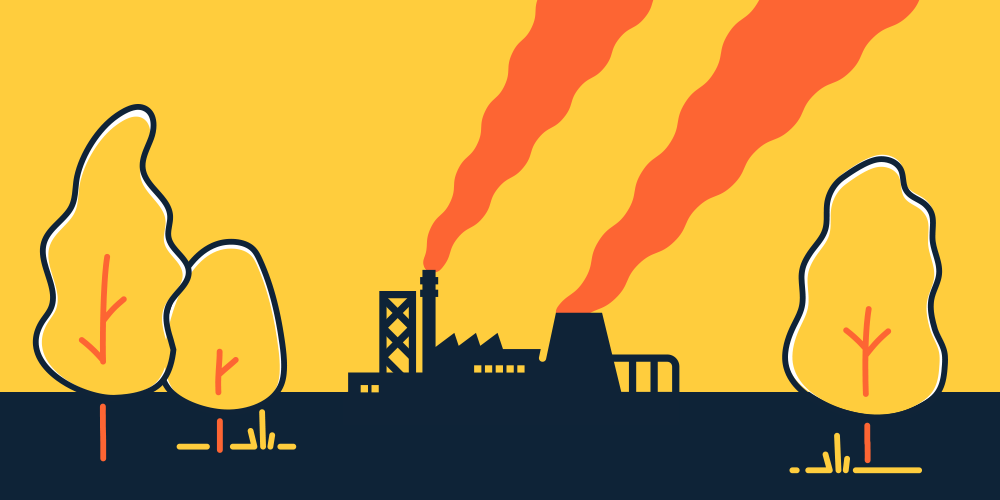
What we breathe affects our brains
Quarantine has come with a major silver lining. Family time? Nope. (Well, maybe—depends on the family.) Better cognition? Not exactly, but the reduced pollution levels we’re seeing could have implications for human thought if we can maintain them. As people have driven less and manufacturing has been on pause, CO2 levels were down 17% in May 2020. And, since high CO2 levels correlate with more air pollution—burning fossil fuels produces both—that means that the atmosphere is cleaner, not just less carbon dense. And that affects our ability to think.
Look at a week’s worth of headlines from a few science websites, and it’s hard to avoid seeing connections between air pollution and neurological diseases. This week, a study came out suggesting that urban dwellers exposed to higher levels of pollution are 30% more likely to have multiple sclerosis. Another from May 20 reads “Scientists Find Evidence Of Link Between Diesel Exhaust, Risk Of Parkinson’s.”
Air pollution is also connected to Alzheimer's disease in the elderly, but University of Montana neuropathologist Lilian Caldern-Garcidueas found that, when exposed to high levels of pollution, even 11 month old children had Alzheimer's-associated proteins in their brains. The culprit? Neurotoxins found in minute particles produced from burning oil, gas, coal, and wood, which are inhaled and then pass into the bloodstream.
Neurotoxins poison tissues in the nervous system, negatively impacting function in the brain. And the particles in which they are found also “wreak havoc on human respiratory and cardiovascular systems, leading to cancer, heart attacks, strokes and early deaths,” according to Scientific American.
Caldern-Garcidueas’ warning that pollution is a risk factor for long-term cognition is reflected by another study of children in the Bronx. Julie Herbstman, director of the Columbia Center for Children's Environmental Health, showed that mothers who had been exposed to high levels of pollution during pregnancy, had children who disproportionately showed attention deficits and “obsessive thoughts and behaviors, or thoughts that others find strange” at age 11. As they grew, these children also displayed higher stress levels, leading the research team to conclude that the neurotoxins present in the polluted air “seem to magnify or sustain the effects of early life social and economic stress on mental health in children." Pollution combined with low earnings produced troubling prospects for some urban youth.
Perhaps it’s not surprising that pollution’s neurotoxins are bad for the human brain, even if it’s shocking that infant brains’ exposure to pollution predicts aspects of their cognitive future. What’s less well known is a pollution effect that we all experience: high concentrations of CO2 have a negative impact on cognition, even at much lower concentrations than what’s officially considered unsafe.
High levels of CO2 are a problem in the atmosphere, but also indoors, where Americans spend 90% of their lives. Offices and classrooms in particular include dozens of people exhaling carbon dioxide and, often, little ventilation. The National Institute for Occupational Safety and Health Administration caps safe levels of CO2 at 5,000 parts per million (ppm), but several studies show decreased cognitive function at between 1,000 and 2,500 ppm. Scientists think those levels are already common in many schools and office spaces today.
“Indoor levels of the gas are projected to climb so high, in fact, that they could cut people's ability to do complex cognitive tasks in half by the end of the century” because as levels outside creep up, ventilation will make less of a difference. Scientists from the University of Colorado and the University of Pennsylvania projected CO2 levels to double by 2100 if nothing is done to stem their rise. If cognition continues to be affected in equal degree as has been currently observed, then, according to back of the envelope calculations, the consequences would be extreme: “we could find ourselves scoring 50% lower on measures of complex thought by the end of the century.” Why? CO2 deprives our brains of oxygen.
As states lift restrictions on movement, it’s unfortunately likely that CO2 and air pollution will rise, too. But some hope for relieving air pollution’s effects comes from the Los Angeles Unified School District, which accidentally discovered that $700 air filters have shown promise in raising test scores. A major 2015 methane leak in LA county caused parents concern that their kids were breathing polluted air at school. To mitigate the effects of the gas, LAUSD added air filters to all classrooms within 5 miles of the leak.
It turned out that methane, which is much lighter than air, dissipated into the atmosphere, so that by the time they were installed, the air filters weren’t filtering any methane from classrooms. That made it possible to gauge student performance with the filtered air versus their normal level of pollution. The difference was staggering and sobering: test scores went up at levels only previously achieved by decreasing class sizes by ⅓, and scores approached gains made at charter KIPP academies.**
Air filters won’t do much for CO2 pollution, though, so we’ve got to put our minds to lessening global CO2 while our brains are still up to the task. What can you do to mitigate the effects of pollution on your own cognition now? Ventilate your home by opening windows, and add a few CO2-absorbing plants—both will prevent indoor CO2 build up. You can also use an air filter to remove other air pollutants, especially if you’re spending a lot of time indoors lately.
**”Math scores went up by 0.20 standard deviations and English scores by 0.18 standard deviations, and the results hold up even when you control for ‘detailed student demographics, including residential ZIP Code fixed effects that help control for a student’s exposure to pollution at home.’”
By Aimee Fountain
References: https://www.vox.com/2020/1/8/21051869/indoor-air-pollution-student-achievement
https://agupubs.onlinelibrary.wiley.com/doi/full/10.1029/2019GH000237
https://www.sciencedaily.com/releases/2020/01/200116155436.htm
https://www.businessinsider.com/carbon-dioxide-indoors-could-reduce-cognitive-abilities-2019-12?
